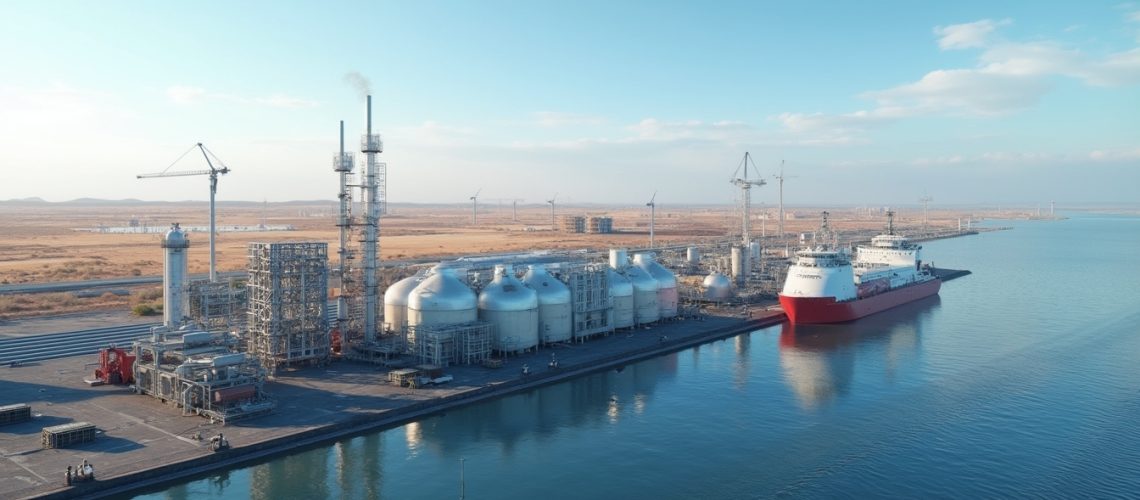How NH3 is Pioneering Decarbonisation in Australian Iron Ore Exports
What is NH3's Clean Energy Strategy for Iron Ore Shipping?
Australia's maritime decarbonisation efforts are taking a significant leap forward with NH3 Clean Energy's innovative approach to transforming iron ore exports. The company's strategic partnership with Pilbara Ports Authority represents a groundbreaking initiative to introduce clean ammonia as a sustainable maritime fuel solution. This strategy is aligned with the broader trend of Australia's green mining revolution which is scaling sustainable resource extraction across the nation.
The project aims to establish a comprehensive clean energy ecosystem, targeting an ambitious production of 600,000 tonnes of clean ammonia per annum. With a planned Final Investment Decision (FID) in the first half of 2026, NH3 is positioning itself at the forefront of maritime decarbonisation technologies. This mirrors efforts in Chile, where sustainable mining practices are being adopted to reclaim valuable minerals from waste.
Charles Whitfield, NH3's chairman, emphasised the significance of the project, noting that "Pilbara Ports have demonstrated their support for handling clean ammonia for the international market." This collaboration leverages existing infrastructure corridors, minimising environmental disruption while maximising operational efficiency. Similar transformations are occurring globally, as seen in Indonesia's groundbreaking mining law revision which is reshaping resource management practices.
The Dampier Port Project: Key Production and Export Targets
The Dampier Port Project represents a pivotal moment in Australia's maritime decarbonisation strategy. With a planned production capacity that aligns with approximately 10% of Japan's current ammonia imports, the project demonstrates significant potential for international market penetration.
- Infrastructure Development: The project features a new-build pipeline integrated with Pilbara's existing Bulk Liquids Berth infrastructure. This strategic approach ensures minimal additional environmental impact while creating a robust framework for clean ammonia transportation.
- Market Penetration: By targeting a significant portion of Japan's imports, the project enhances Australia's position as a leader in clean energy exports.
How is Technological Innovation Driving Clean Fuel Transportation?
Technological innovation lies at the heart of NH3's decarbonisation efforts. The project's bunkering vessel design is specifically tailored to serve bulk carriers involved in iron ore exports, addressing the unique challenges of maritime ammonia transportation. This reflects a broader trend toward adopting cutting-edge technologies, such as virtual reality for enhancing safety and efficiency in mining operations.
Industry experts highlight the complexity of ammonia as a marine fuel, noting its energy density of 18.6 MJ/kg compared to diesel's 45 MJ/kg. This characteristic necessitates innovative storage and combustion solutions to ensure practical and efficient implementation. Key technological components include:
- Vessel Design: Enhanced to accommodate the specific properties of ammonia.
- Storage Systems: Innovations ensure safe and efficient onboard storage.
- Combustion Technology: Solutions to optimise ammonia's energy potential.
Decarbonisation Milestones and Future Outlook
NH3's decarbonisation journey is marked by strategic milestones and forward-thinking approaches. The completion of Pre-FEED engineering sets the stage for a transformative shift in maritime fuel technologies. Preliminary estimates suggest that the 600,000 tonnes of annual ammonia production could potentially avoid approximately 1.2 million tonnes of CO₂ emissions, representing a significant contribution to global decarbonisation efforts.
- Milestone Achievements: With engineering complete, implementation of clean fuel technologies is on the horizon.
- Emissions Reduction Impact: Substantial CO₂ emissions reduction aligns with global sustainability goals.
What are the Strategic Implications for Australian Iron Ore Exports?
The project extends beyond technological innovation, offering substantial strategic implications for Australia's iron ore export sector. Current data indicates that iron ore exports generate approximately 7% of global maritime CO₂ emissions, making decarbonisation efforts crucial.
Maritime analysts predict that ammonia bunkering hubs could reduce supply chain emissions by up to 50% by 2035, positioning Australia as a global leader in sustainable maritime technologies. This transition supports a new era of resource management, akin to Rio Tinto's investment in Argentina for lithium production.
FAQ: Clean Ammonia in Maritime Shipping
Clean ammonia represents a promising alternative to traditional marine fuels, but its implementation requires sophisticated technological solutions. The combustion process necessitates pilot fuels like hydrogen for ignition, highlighting the complex engineering challenges involved.
The International Maritime Organization's 2024 emissions guidelines provide a regulatory framework supporting the transition to cleaner maritime fuel technologies. Consequently, strategic compliance with these regulations is essential for global maritime operators.
Expert Perspectives
Independent researchers emphasise that while the potential is immense, infrastructure costs remain a significant barrier to widespread adoption. The NH3 project offers a practical blueprint for overcoming these challenges through strategic partnerships and innovative engineering.
By integrating global decarbonisation benchmarks, technical specifications, and comprehensive safety protocols, NH3 is not just developing a project but pioneering a new paradigm in sustainable maritime transportation. The use of ammonia and its development mirrors green practices in other sectors, showcasing a holistic approach to environmental responsibility.
This expansive initiative not only addresses immediate decarbonisation needs but also sets a precedent for future projects worldwide, reinforcing Australia's commitment to leading the charge in maritime innovation and environmental stewardship.
Want to Stay Ahead in Sustainable Maritime Technologies?
Discover groundbreaking investment opportunities in clean energy and maritime decarbonisation with Discovery Alert's real-time AI-driven notifications, which help investors navigate complex industry transformations and identify emerging technological innovations before they hit the mainstream market.







